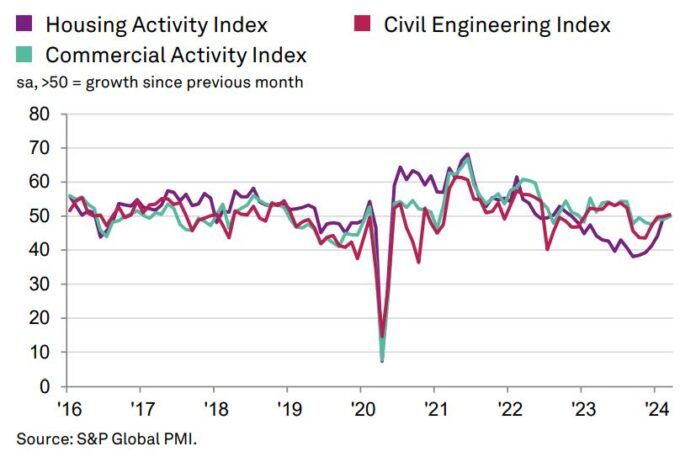UK construction companies have indicated a renewed increase in total industry activity during March, ending a six-month period of decline.
The headline S&P Global UK Construction Purchasing Managers’ Index (PMI) rose from 49.7 in February to 50.2 in March 2024, which, while signalling only a fractional rise in business activity, is highest level since August 2023.
Survey respondents often commented on a turnaround in sales pipelines and greater new business enquiries linked to the improving economic outlook and more stable financial conditions.
At a glance
March data pointed to a moderate increase in new work received by construction companies. Moreover, the rate of expansion accelerated since February and was the strongest for ten months. Anecdotal evidence pointed to a general rise in new project starts and greater tender opportunities across the construction sector so far in 2024.
Adding to signs of a recovery in construction sector performance, new orders expanded at the fastest pace since May 2023.
Civil engineering was the best-performing segment in March, as output levels increased at a marginal pace. Panel members cited increased work on infrastructure projects and resilient demand in the energy sector.
House building and commercial construction activity were both broadly unchanged in March. However, this stabilisation represented the best performance for this category since November 2022.
Staffing
In contrast to the positive trends for output and new orders, latest data signalled another reduction in staffing numbers, with employment numbers falling for the third month running in March.
However, the rate of job shedding was only marginal and eased since the previous month. At the same time, sub-contractor usage was stable in March. The latest survey indicated a strong improvement in sub-contractor availability but rates charged by sub-contractors increased at the fastest pace since August 2023.
Costs
Purchasing costs rose for the third month running in March. However, the rate of inflation was only marginal and the weakest seen over this period. Survey respondents noted increasing transport costs, but others suggested that strong competition among suppliers had constrained the overall rate of input price inflation.
Meanwhile, suppliers’ delivery times shortened for the thirteenth consecutive month in March, albeit to only a moderate extent. Anecdotal evidence suggested that improving materials availability and subdued demand had contributed to improving vendor performance.
Outlook
Construction companies remain upbeat about their prospects for business activity in the next 12 months. Around 49% of the survey panel anticipate a rise in output levels, while only 11% predict a decline. However, the degree of optimism eased since February and was the lowest in 2024 to date.
Survey respondents typically commented on stronger order books and hopes that broader market conditions will continue to improve, especially in relation to house building projects. Meanwhile, political uncertainty, squeezed margins and financial pressures were cited as factors weighing on the optimism.
Industry comment
Atul Kariya, head of real estate and construction at accountancy firm MHA, commented: “While the slight rise in today’s construction PMI data is positive news and reflects improved sentiment from an admittedly low base, it is certainly not a sign of sustained recovery in the sector, and conditions remain challenging.
“Activity in the commercial sector is picking up steadily although typically contracts are continually being deferred to later in the year. Housebuilders have had a mixed 2024, with the year starting well but a subsequent dip in February and March. Despite the drop in house prices last month reported this morning by Halifax our clients are anticipating that sentiment will improve as we head into late Spring and early Summer, as it typically does every year, as pressures are easing with interest rates probably peaking, mortgage rates falling again, and material and labour costs stabilising, offering a window of opportunity to the sector.
“However, to ensure a sustained recovery for the housing industry the basic fundamentals have to change. The lack of political stability, relatively high corporation tax in comparison with competitors like Ireland, and the associated cost of capital in the UK are making it a less favourable option for real estate investors. The next government, of whatever political persuasion, needs to set out a five-year plan to support the industry and make the UK attractive to investors once again.”




